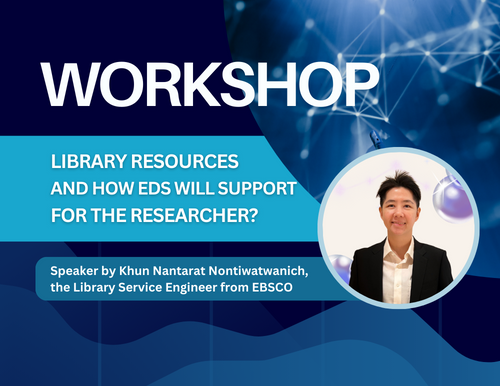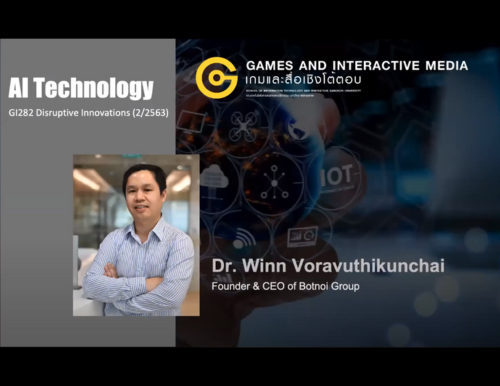The EBSCO database involves searching and accessing high-quality academic articles and research. The steps include targeted searching, reading, downloading, and saving desired articles in the system. Filters and advanced search functions help narrow down results to better match specific needs.
การทำงานในยุคปัจจุบันและอนาคตจะต้องพึ่งพาข้อมูลและเทคโนโลยีอย่างมาก คนที่สามารถวิเคราะห์ข้อมูลและใช้เทคโนโลยีได้อย่างมีประสิทธิภาพจะมีข้อได้เปรียบในการแข่งขันในตลาดแรงงาน การมีทักษะที่ทันสมัยจะช่วยให้สามารถตอบสนองต่อการเปลี่ยนแปลงของอุตสาหกรรมและนวัตกรรมใหม่ๆ ได้ดีขึ้น โดย คุณกล้า ตั้งสุวรรณ
Introducing English eBooks website. Find and choose your favorite books with ease at your fingertips. You can instantly access your favorite books. By Library and Learning Space
การบรรยายเกี่ยวกับแนวคิดธุรกิจ 4.0 Business opportunity การนำเทคโนโลยีสมัยใหม่เข้ามาประยุกต์ใช้ในการทำธุรกิจ และโอกาสที่ทำให้ธุรกิจสามารถสร้างรายได้หรือกำไรจากการเสนอผลิตภัณฑ์หรือบริการที่ตอบสนองความต้องการของตลาดหรือกลุ่มลูกค้าเป้าหมาย บรรยายโดย คุณวีณา อรัญญเกษม
Lao economy, Lao job market & labor law, AEC and labor mobility, demand for talents, get yourself ready and about 108JOB By Keovisouk Dalasane
Lao economy, Lao job market & labor law, AEC and labor mobility, demand for talents, get yourself ready and about 108JOB By Keovisouk Dalasane
Lao economy, Lao job market & labor law, AEC and labor mobility, demand for talents, get yourself ready and about 108JOB By Keovisouk Dalasane
การบรรยายเกี่ยวกับการวางแผน Influencer Campaign, KOL Planning Workshop, Influencer's Tiers, Consumer journey step,
About Influencer Department โดยคุณพัชรนันท์ ด่านชัย เมื่อวันที่ 20 มีนาคม 2567
This workshop covers advanced searching and the more sophisticated of databases in the EBSCOhost platform. Library Resources, What is EDS and how it works?, Techniques in “Feature & Setting”, How EDS support the researcher. By Nantarat Nontiwatwanich on January 20, 2024
การบรรยายแบบออนไลน์ เรื่อง Artificial Intelligence Technology
โดย Dr. Win Voravuthikunchai, Founder & CEO Botnoi Group
เมื่อวันที่ 24 มีนาคม 2564
เป็นส่วนหนึ่งของวิชา GI282 Disruptive Innovation ปีการศึกษา 2563







